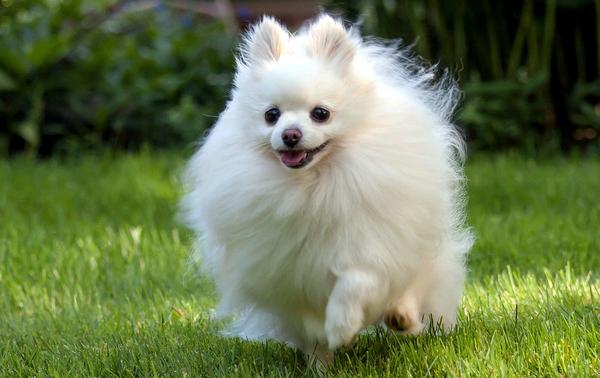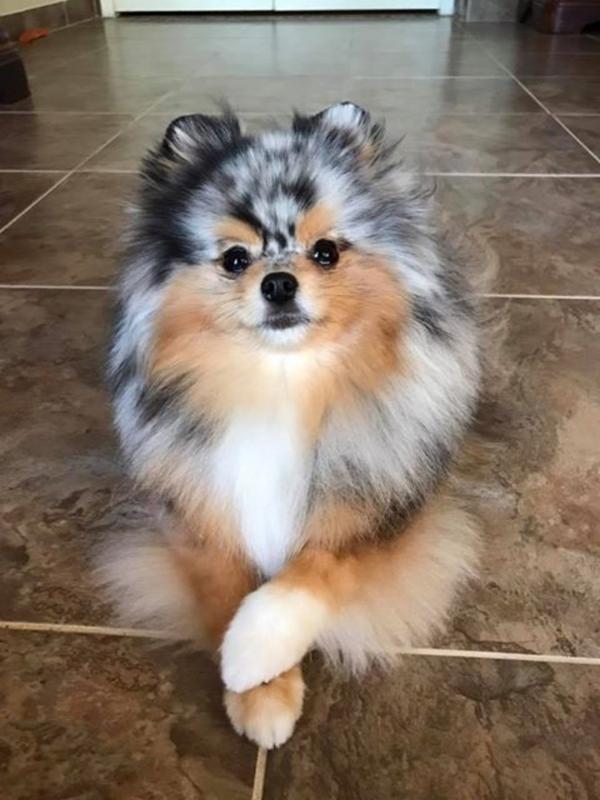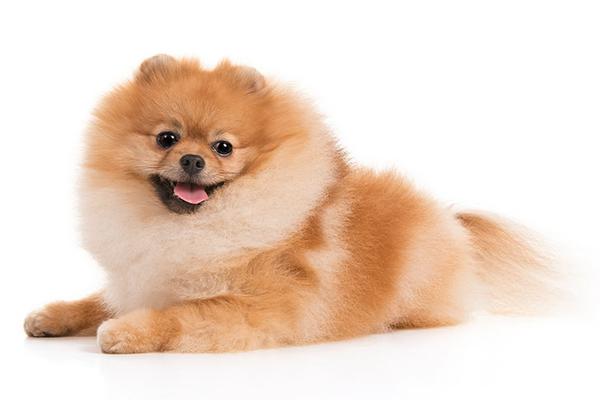Pomeranian
also known as Spitz Nain, Pom Pom, Deutsche Spitze, Spitz Enano, Zwers, Zwergspitz, Pom

 History
History
The Pomeranian is a small dog breed that originated in the region of Pomerania, now part of modern-day Germany and Poland. This breed is known for its fluffy coat, small size, and lively personality. The Pomeranian has a rich history that dates back to the 18th century.
The Pomeranian can trace its origins to the larger Spitz-type dogs that were used by the indigenous people of the region of Pomerania. These dogs were used for herding, hunting and as a watchdog. Over time, these dogs were bred down in size to create the smaller Pomeranian we know today.
In the 18th century, the Pomeranian was a popular dog among the European royalty. Queen Victoria of England was a particularly famous Pomeranian enthusiast, and her patronage of the breed helped to make it a popular pet among the upper classes.
In the late 19th century, the Pomeranian was recognized by the Kennel Club (UK) and the American Kennel Club, and the breed standard was established. The Pomeranian was also recognized by the FCI in 1888.
In the 20th century, the Pomeranian's popularity continued to grow, and it became a popular companion dog and show dog. They are known for their intelligence, trainability and affectionate nature. Pomeranians are also used as therapy dogs and as a companion dog for the elderly and disabled.
Nowadays, the Pomeranian is a small, active and lively dog, known for its fluffy coat and its friendly personality. They are highly trainable, and they excel in obedience, agility and tricks training. They are also great for apartment living, and they make a great companion for people of all ages.
Breed Information
Is Pomeranian a purebred?
Purebred
What were Pomeranians originally used for?
Companion, Working Dog
How Long Do Pomeranians Live? What is average life expectancy for a Pomeranian? How long can Pomeranians live?
12-16 years
The average Pomeranian lifespan is somewhere between 12-16 years, provided they aren't beset by any exceptional health issues or injuries.
Pomeranian Height & Weight
How big is a full grown Pomeranian?

| Height | ||||
|---|---|---|---|---|
| Average | 6 months | 12 months | 18 months | |
| Male | 8-11 inches (20.3 - 27.9 cm) | 4.5 inches (11.4 cm) | 7.0 inches (17.8 cm) | 8.5 inches (21.6 cm) |
| Female | 8-11 inches (20.3 - 27.9 cm) | 4.5 inches (11.4 cm) | 7.0 inches (17.8 cm) | 8.5 inches (21.6 cm) |
| Weight | ||||
|---|---|---|---|---|
| Average | 6 months | 12 months | 18 months | |
| Male | 3-7 pounds (1 - 3 kg) | 3.0 pounds (1 kg) | 4.0 pounds (2 kg) | 5.0 pounds (2 kg) |
| Female | 3-7 pounds (1 - 3 kg) | 3.0 pounds (1 kg) | 4.0 pounds (2 kg) | 5.0 pounds (2 kg) |
Do Pomeranians get fat easily?
![]()
![]()
![]()
![]()
![]()
The Pomeranian is a breed that has an average to high tendency to gain weight if their weight is not closely monitored. It is important to maintain a balance between exercise and food intake to keep them at a healthy weight. This can be achieved by scheduling at least one daily walk and engaging in regular playtime with them.
Are Pomeranians Hypoallergenic?
No
Unfortunately, the Pomeranian is not hypoallergenic, making it not a good choice for a dog lover who suffers from pet allergies.
What is a Pomeranian personality? What are Pomeranian dogs best known for?
Active
Friendly
Lively
Sociable
Extroverted
Intelligent
Playful
Attentive
Docile
Trainable
Are Pomeranians heavy shedders? How Much Does a Pomeranian Shed?
![]()
![]()
![]()
![]()
![]()
Pomeranian dogs are not heavy shedders, but they will lose a significant amount of hair each year. To decrease the amount of shedding, you can regularly brush your Pomeranian. This will remove loose hair and keep his coat growing in the same direction.
What is the watchdog ability of a Pomeranian dog?
![]()
![]()
![]()
![]()
![]()
The Pomeranian dogs are average watchdogs. If they sense something different, this breed will alert their owner.
Breed History
Where do Pomeranians come from?
Germany
What are Pomeranians descended from?
Norwegian Elkhound, German Spitz, Samoyed, American Eskimo Dog, Schipperke
What organizations or kennel clubs recognize/register the Pomeranian breed?
American Canine Registry
American Kennel Club
America's Pet Registry
Canadian Kennel Club
Dog Registry of America Inc.
Kennel Club of Great Britain
North American Purebred Registry, Inc.
American Canine Association, Inc.
Australian National Kennel Council
Continental Kennel Club
National Kennel Club
New Zealand Kennel Club
United Kennel Club
Canadian Canine Registry
When were Pomeranians first bred? How old is the Pomeranian breed?
1800s
What Breed Group is a Pomeranian?
Toy (AKC:1888)
Companion Breeds (UKC)

Pomeranian Appearance
What color are Pomeranian eyes?
Blue
Brown
What color can Pomeranian nose be naturally?
Black
Brown
Isabella
What color can Pomeranian coat be naturally?
Silver
Cream
Red
Brown
Fawn
Gray
Black
White
How long is a Pomeranians coat?
![]()
![]()
![]()
![]()
![]()
The coat of a Pomeranian falls in the medium length category.
How Dense Is The Pomeranian Coat?
![]()
![]()
![]()
![]()
![]()
What is the texture of the hair of a Pomeranian?
Straight
How many puppies can a Pomeranian have in a litter? How many puppies can a Pomeranian have in her first litter?
12-16 puppies per pregnancy
A Pomeranian can have a litter of 12-16 puppies on average. However, it's worth noting that the size of the litters can vary greatly. Factors that can influence litter size include the health of the mother, breeding history, and genetics.
![]()
![]()
![]()
![]()
![]()
Pomeranians are known for their adaptability and versatility, they are capable of adapting well to a wide range of lifestyle changes and living environments. They are a highly adaptable breed, and make great companions for families and individuals of all lifestyles.

Pomeranian Health Issues
Do Pomeranians have a lot of health problems?
![]()
![]()
![]()
![]()
![]()
The Pomeranian is generally considered to be healthy. However, like all breeds, they are susceptible to certain health issues and it is important to keep an eye out for them and address them with your veterinarian as needed.
What are the major health concerns to be aware of when owning a Pomeranian?
Patellar Luxation
Entropion
Mono/Bilateral Cryptorchidism
Legg-Calve-Perthes Disease
Collapsed Trachea
What are the less significant issues to keep in mind when it comes to Pomeranians?
Cataracts
Allergies
Epilepsy
What are the occasional tests recommended for Pomeranian breed?
Eye
Knee
X-Rays
MRI
Eye Examination
Physical Examination
Allergy Tests

Pomeranian Needs and Activities
Do Pomeranians have a lot of energy?
![]()
![]()
![]()
![]()
![]()
For those who lead a balanced lifestyle, Pomeranians may be a good choice as they have an average energy level.
Do Pomeranians need socialization? How social are Pomeranians?
![]()
![]()
![]()
![]()
![]()
Pomeranian have very high social needs. These needs include regular mental and physical stimulation, a job or purpose, and companionship. They thrive in environments where they have a lot of interaction with humans and other dogs.
How much exercise should Pomeranians get?
![]()
![]()
![]()
![]()
![]()
The Pomeranians a breed that requires only a small amount of physical activity to maintain a healthy lifestyle. These breeds are ideal for people with busy lifestyles, elderly people or those who have limited mobility. They also make great pets for those who live in small apartments or have limited outdoor space.
How much sleep should a Pomeranian have? Do Pomeranians sleep a lot?
![]()
![]()
![]()
![]()
![]()
The Pomeranian breed is known for its moderate energy levels and normal sleep patterns, typically sleeping around 12-14 hours per day.
Does a Pomeranian drool a lot?
![]()
![]()
![]()
![]()
![]()
The Pomeranian is a breed of dog that is characterized by its minimal drooling, making it an ideal choice for people who dislike drool marks on their clothing.
How much does it bark?
![]()
![]()
![]()
![]()
![]()
The Pomeranian is a vocal breed, with a tendency to bark and howl frequently. They may not be the best fit for those seeking a quiet companion. Their barks can vary and can indicate different emotions and needs.
Do Pomeranians exhibit aggressive behavior to safeguard their home and territory? Do they possess a natural tendency to guard?
![]()
![]()
![]()
![]()
![]()
These dogs are known for their strong territorial instinct and protective nature. They will fiercely defend their territory and are highly alert and vigilant against any perceived threat to their home and family.
Are Pomeranians mouthy?
![]()
![]()
![]()
![]()
![]()
What is the likelihood of a Pomeranian running away? Do they have a tendency to explore or wander frequently?
![]()
![]()
![]()
![]()
![]()
Do Pomeranian dogs have a high prey drive?
![]()
![]()
![]()
![]()
![]()
What do Pomeranians enjoy doing? How do I keep my Pomeranian busy?
Walking, Barking, Petting, Eating Snacks, Nap, Brushing, Sleep, Bark, Walk, Observing, Sniffing, Fetch, Go to Park, Groom, Being talked to, Wrestling, Pets, Kisses, Running, Exploring, Slow walking, Sleeping, Growling, Run, Shake, Investigate, Play, Chase, Catch treats, Dog Parks
What is the energy level of a Pomeranian? How much energy does a Pomeranian have?
Medium
Pomeranians are medium-energy dogs and typically enjoy socializing and playing casual or even sustained games of chase with other dogs. They may also have occasional periods of barking or racing around the house.
![]()
![]()
![]()
![]()
![]()
How far should a Pomeranian walk each week? How many miles should a Pomeranian walk every week?
5 miles / week
There's really no limit to how far you walk your dog as long as they're comfortable. For Pomeranian, it's at least 5 miles / week. Just remember to build distance and stamina gradually over time.
How much a Pomeranian should exercise a day? How much activity does a Pomeranian need?
40 minutes
In general most Pomeranians usually need at least 40 minutes of exercise daily. This can be spread across the day and include all sorts of high-energy activities, like walking, running and playing.
What level of grooming should be provided for a Pomeranian?
![]()
![]()
![]()
![]()
![]()
The Pomeranian is a breed of dog that requires an average amount of grooming effort.
How often should you brush a Pomeranian?
Daily
Ideally, Pomeranian should be brushed at least 2 or 3 times a week (preferably daily) improve shedding.
What are the most commonly used brushing tools for Pomeranians?
Slicker Brush
Comb
Deshedder
Nail Clipper
Costs
How many cups of food does a Pomeranian eat?
1 cups
For an average 3-7 pound (1 - 3 kg) Pomeranian feed 1 cups daily. But, keep in mind, the amount you feed is going to be dependent on the quality of the food you are feeding.
How Much Does a Pomeranian Cost Daily?
$1.40 - $2.80 / day
The average cost of a Pomeranian is somewhere $1.40 - $2.80 per day.
How Much Does a Pomeranian Cost Per Month?
$35 - $42 / month
The average per month expenses of a Pomeranian is between $35 - $42. This makes an average of $420 - $504 per year. It will be on the higher side when the dog is still small because it will need more frequent visits to the vet, shots.
Pomeranian Characteristic
How intelligent is a Pomeranian?
![]()
![]()
![]()
![]()
![]()
The Pomeranian breed is considered very intelligent and easy to train.
How sensitive is a Pomeranian dog?
![]()
![]()
![]()
![]()
![]()
This dog breed is more sensitive than others and easily overwhelmed by new surroundings and people. They need gentle handling and a calm, stable home environment with positive reinforcement training.
Are Pomeranian dogs affectionate?
![]()
![]()
![]()
![]()
![]()
Do Pomeranian do well in apartments? Are Pomeranians good indoor dogs?
![]()
![]()
![]()
![]()
![]()
Pomeranians are known for being excellent apartment dogs. They are fairly active indoors and will do okay without a yard.
Are Pomeranians good with kids? Are Pomeranians good around children?
![]()
![]()
![]()
![]()
![]()
Pomeranians are not the most kid-friendly dogs. If you have children, you might want to reconsider adopting another dog as a companion.
Are Pomeranians good for elderly?
![]()
![]()
![]()
![]()
![]()
Are Pomeranians good with cats? How friendly Pomeranians are toward cats?
![]()
![]()
![]()
![]()
![]()
Pomeranians are very cat friendly dogs. They generally make good companions for cats.
Do Pomeranian dogs get along with other dogs? Are Pomeranians OK with other dogs?
![]()
![]()
![]()
![]()
![]()
Pomeranians are average friendly towards other dogs. If they are raised with other dogs, they are likely to get along with them. And, if they are socialized properly from a young age, they will usually be great with other dogs.
How do Pomeranian dogs interact with other pets? Are they considered pet-friendly?
![]()
![]()
![]()
![]()
![]()
Are Pomeranians friendly with strangers?
![]()
![]()
![]()
![]()
![]()
Pomeranians are below average friendly around strangers. Keen of eye and sharp of tongue, most Pomeranians are very quick to announce strangers at the door. Once the visitor comes in, some Pomeranians will be friendly and outgoing. But many others have the standoffish or suspicious towards strangers.
Do Pomeranians like to play? Are Pomeranians playful?
![]()
![]()
![]()
![]()
![]()
Pomeranians have an average level of playfulness. The Pomeranians, like other dogs, like to play. But they are not the most playful dog breed.
Are Pomeranian easily trained?
![]()
![]()
![]()
![]()
![]()
Pomeranian dogs are known for their ease of training and ability to learn quickly, making them a popular choice for pet owners and trainers alike.
 Pros & Cons
Pros & Cons
Pros
- Small size
Suitable for small homes or apartments - Cat Friendly
Pomeranians and cats tend to be a suitable pairing. - Good with children and other pets
Making them a great family pet - Service Dog
This breed is a good fit for service dog training and work. - Therapy Dog
This breed possesses the necessary traits to succeed as a therapy dog. - Intelligent
Easy to train, suitable for obedience and agility training - Affectionate
Loyal towards their owners, making them great companion dogs
Cons
- Tendency to gain weight
Not paying attention to a Pomeranian's weight can cause it to become overweight. - Not suitable for office environment
Pomeranians may struggle to adapt to an office environment. - Not Hypoallergenic
Allergy sufferers may want to consider a different breed of dog, as Pomeranians may not be a good fit due to the potential for allergic reactions. - Barking
The Pomeranian breed is known for its loudness.